Empowerment Approach for Social Work Intervention: Report
VerifiedAdded on 2020/11/23
|12
|3527
|235
Report
AI Summary
This report examines the empowerment approach within social work interventions, focusing on the Australian Institute for Patient and Family Centred Care (AIPFCC). It explores how social workers can empower clients, emphasizing strategies to enhance their capabilities and independence. The report details the steps in social work interventions, including assessment, intervention methods, and the importance of client-worker relationships. It highlights the benefits of empowerment for both clients and professionals, covering various empowerment strategies, policy implications, and the significance of client satisfaction. The analysis also addresses the role of social workers in fostering client self-awareness, the importance of a strength-based approach, and the impact of management and partnerships within the AIPFCC framework. Ultimately, the report underscores how empowerment can lead to enhanced self-efficacy and improved interpersonal relationships, and overall well-being.
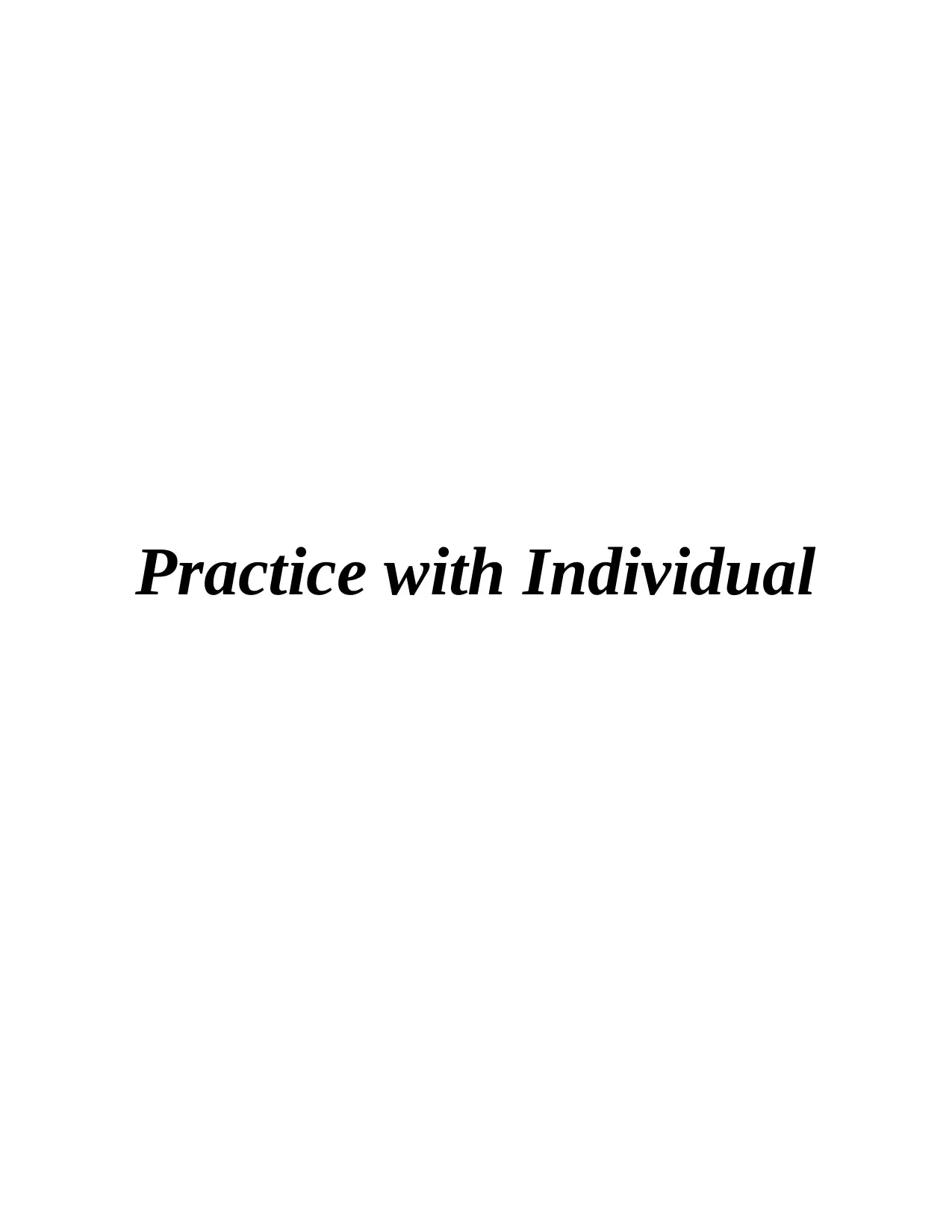
Practice with Individual
Paraphrase This Document
Need a fresh take? Get an instant paraphrase of this document with our AI Paraphraser
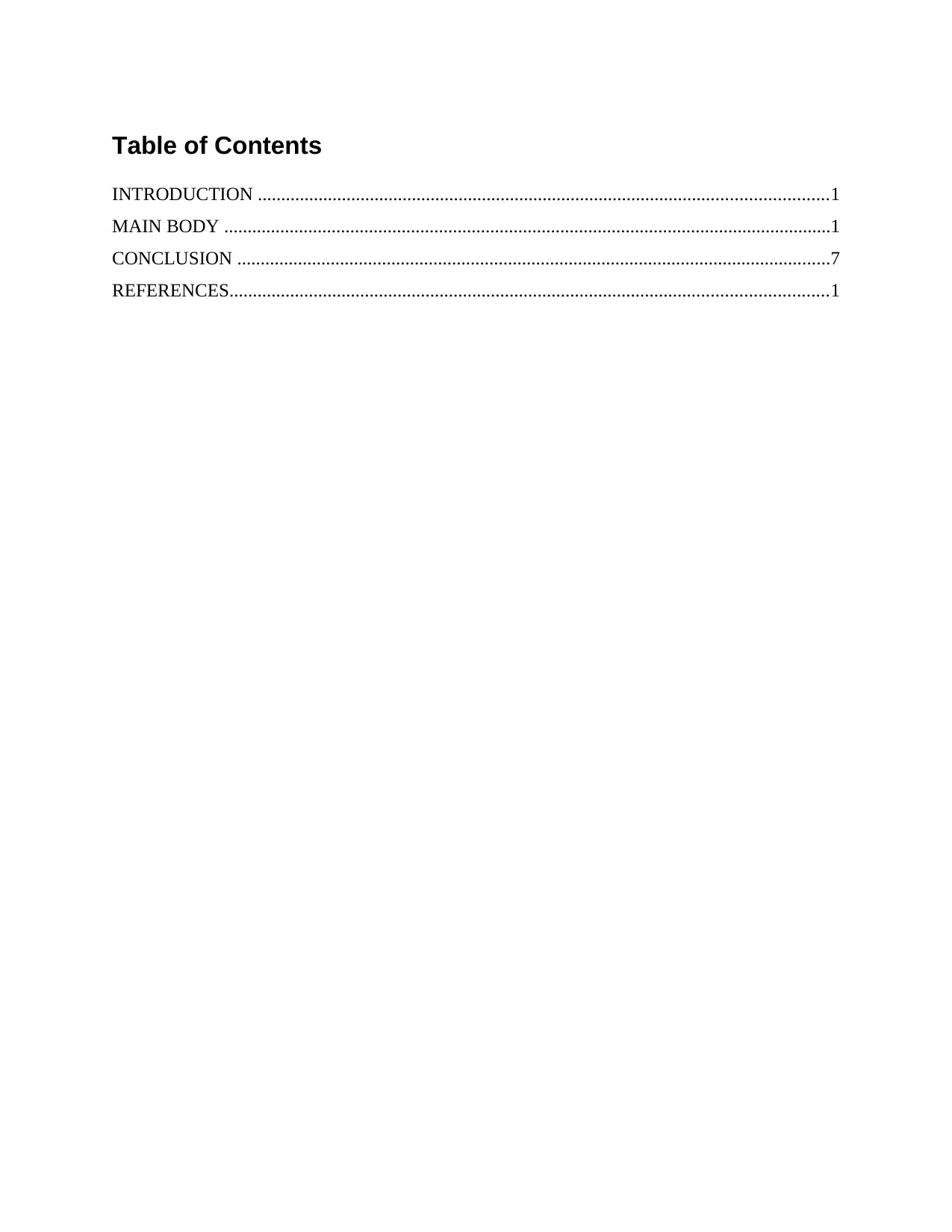
Table of Contents
INTRODUCTION ..........................................................................................................................1
MAIN BODY ..................................................................................................................................1
CONCLUSION ...............................................................................................................................7
REFERENCES................................................................................................................................1
INTRODUCTION ..........................................................................................................................1
MAIN BODY ..................................................................................................................................1
CONCLUSION ...............................................................................................................................7
REFERENCES................................................................................................................................1
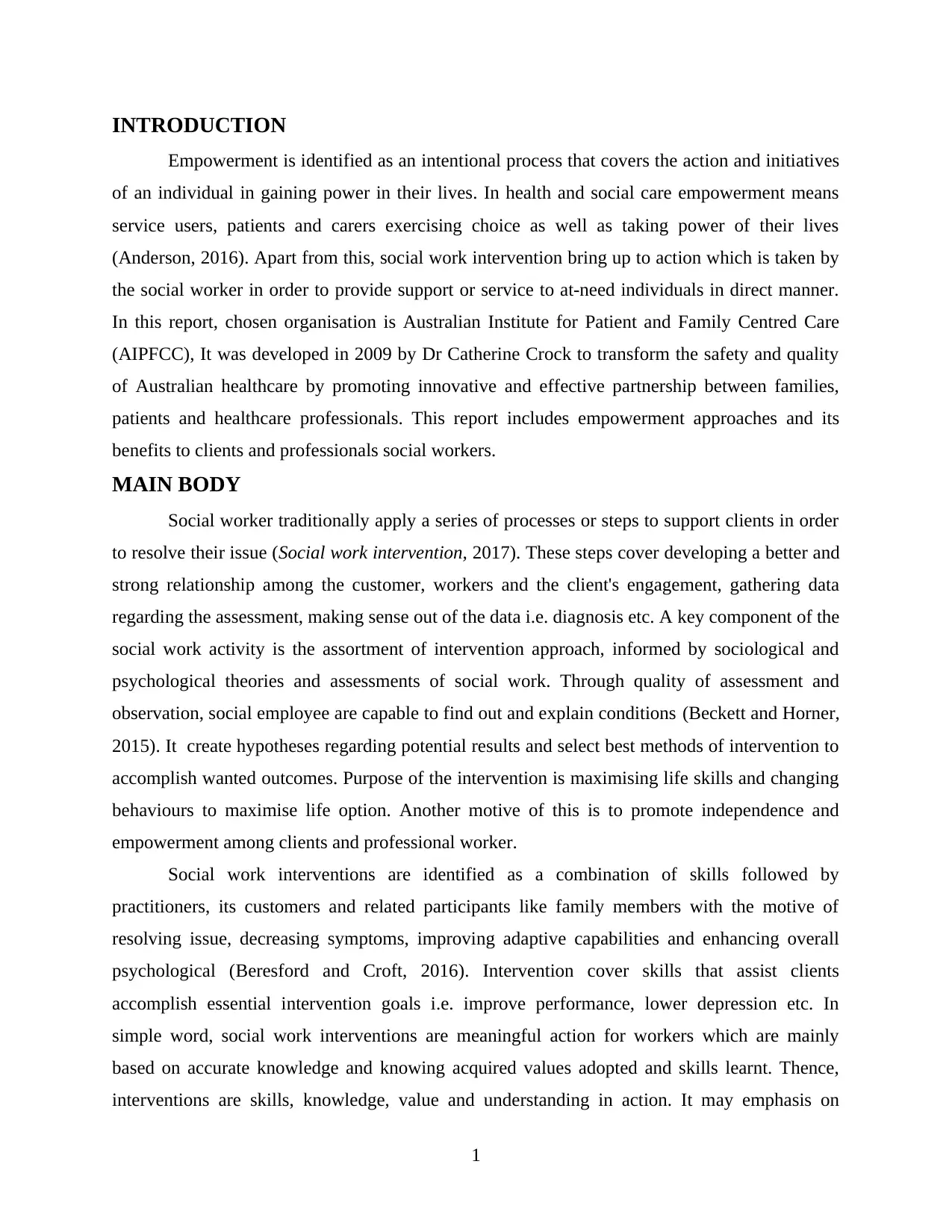
INTRODUCTION
Empowerment is identified as an intentional process that covers the action and initiatives
of an individual in gaining power in their lives. In health and social care empowerment means
service users, patients and carers exercising choice as well as taking power of their lives
(Anderson, 2016). Apart from this, social work intervention bring up to action which is taken by
the social worker in order to provide support or service to at-need individuals in direct manner.
In this report, chosen organisation is Australian Institute for Patient and Family Centred Care
(AIPFCC), It was developed in 2009 by Dr Catherine Crock to transform the safety and quality
of Australian healthcare by promoting innovative and effective partnership between families,
patients and healthcare professionals. This report includes empowerment approaches and its
benefits to clients and professionals social workers.
MAIN BODY
Social worker traditionally apply a series of processes or steps to support clients in order
to resolve their issue (Social work intervention, 2017). These steps cover developing a better and
strong relationship among the customer, workers and the client's engagement, gathering data
regarding the assessment, making sense out of the data i.e. diagnosis etc. A key component of the
social work activity is the assortment of intervention approach, informed by sociological and
psychological theories and assessments of social work. Through quality of assessment and
observation, social employee are capable to find out and explain conditions (Beckett and Horner,
2015). It create hypotheses regarding potential results and select best methods of intervention to
accomplish wanted outcomes. Purpose of the intervention is maximising life skills and changing
behaviours to maximise life option. Another motive of this is to promote independence and
empowerment among clients and professional worker.
Social work interventions are identified as a combination of skills followed by
practitioners, its customers and related participants like family members with the motive of
resolving issue, decreasing symptoms, improving adaptive capabilities and enhancing overall
psychological (Beresford and Croft, 2016). Intervention cover skills that assist clients
accomplish essential intervention goals i.e. improve performance, lower depression etc. In
simple word, social work interventions are meaningful action for workers which are mainly
based on accurate knowledge and knowing acquired values adopted and skills learnt. Thence,
interventions are skills, knowledge, value and understanding in action. It may emphasis on
1
Empowerment is identified as an intentional process that covers the action and initiatives
of an individual in gaining power in their lives. In health and social care empowerment means
service users, patients and carers exercising choice as well as taking power of their lives
(Anderson, 2016). Apart from this, social work intervention bring up to action which is taken by
the social worker in order to provide support or service to at-need individuals in direct manner.
In this report, chosen organisation is Australian Institute for Patient and Family Centred Care
(AIPFCC), It was developed in 2009 by Dr Catherine Crock to transform the safety and quality
of Australian healthcare by promoting innovative and effective partnership between families,
patients and healthcare professionals. This report includes empowerment approaches and its
benefits to clients and professionals social workers.
MAIN BODY
Social worker traditionally apply a series of processes or steps to support clients in order
to resolve their issue (Social work intervention, 2017). These steps cover developing a better and
strong relationship among the customer, workers and the client's engagement, gathering data
regarding the assessment, making sense out of the data i.e. diagnosis etc. A key component of the
social work activity is the assortment of intervention approach, informed by sociological and
psychological theories and assessments of social work. Through quality of assessment and
observation, social employee are capable to find out and explain conditions (Beckett and Horner,
2015). It create hypotheses regarding potential results and select best methods of intervention to
accomplish wanted outcomes. Purpose of the intervention is maximising life skills and changing
behaviours to maximise life option. Another motive of this is to promote independence and
empowerment among clients and professional worker.
Social work interventions are identified as a combination of skills followed by
practitioners, its customers and related participants like family members with the motive of
resolving issue, decreasing symptoms, improving adaptive capabilities and enhancing overall
psychological (Beresford and Croft, 2016). Intervention cover skills that assist clients
accomplish essential intervention goals i.e. improve performance, lower depression etc. In
simple word, social work interventions are meaningful action for workers which are mainly
based on accurate knowledge and knowing acquired values adopted and skills learnt. Thence,
interventions are skills, knowledge, value and understanding in action. It may emphasis on
1
⊘ This is a preview!⊘
Do you want full access?
Subscribe today to unlock all pages.

Trusted by 1+ million students worldwide
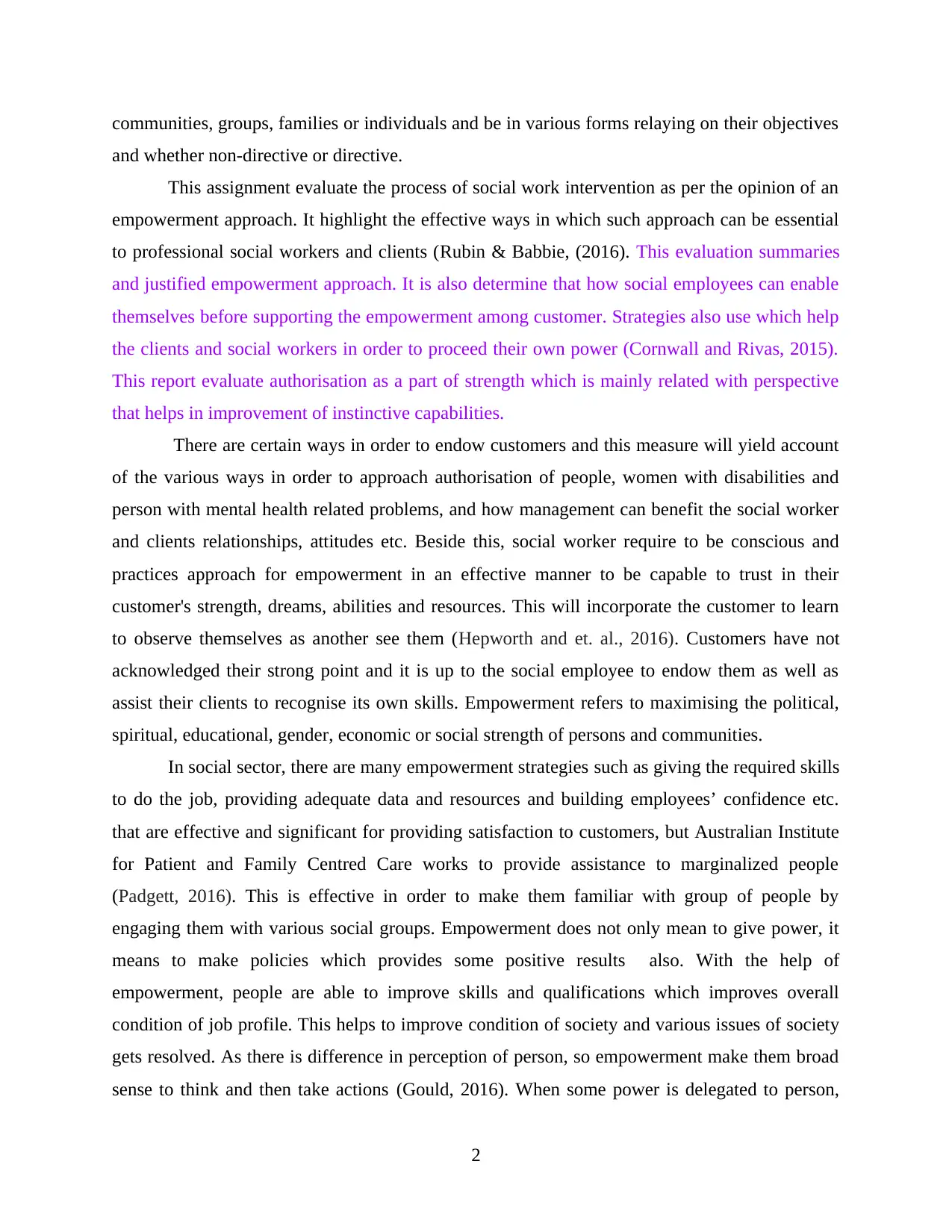
communities, groups, families or individuals and be in various forms relaying on their objectives
and whether non-directive or directive.
This assignment evaluate the process of social work intervention as per the opinion of an
empowerment approach. It highlight the effective ways in which such approach can be essential
to professional social workers and clients (Rubin & Babbie, (2016). This evaluation summaries
and justified empowerment approach. It is also determine that how social employees can enable
themselves before supporting the empowerment among customer. Strategies also use which help
the clients and social workers in order to proceed their own power (Cornwall and Rivas, 2015).
This report evaluate authorisation as a part of strength which is mainly related with perspective
that helps in improvement of instinctive capabilities.
There are certain ways in order to endow customers and this measure will yield account
of the various ways in order to approach authorisation of people, women with disabilities and
person with mental health related problems, and how management can benefit the social worker
and clients relationships, attitudes etc. Beside this, social worker require to be conscious and
practices approach for empowerment in an effective manner to be capable to trust in their
customer's strength, dreams, abilities and resources. This will incorporate the customer to learn
to observe themselves as another see them (Hepworth and et. al., 2016). Customers have not
acknowledged their strong point and it is up to the social employee to endow them as well as
assist their clients to recognise its own skills. Empowerment refers to maximising the political,
spiritual, educational, gender, economic or social strength of persons and communities.
In social sector, there are many empowerment strategies such as giving the required skills
to do the job, providing adequate data and resources and building employees’ confidence etc.
that are effective and significant for providing satisfaction to customers, but Australian Institute
for Patient and Family Centred Care works to provide assistance to marginalized people
(Padgett, 2016). This is effective in order to make them familiar with group of people by
engaging them with various social groups. Empowerment does not only mean to give power, it
means to make policies which provides some positive results also. With the help of
empowerment, people are able to improve skills and qualifications which improves overall
condition of job profile. This helps to improve condition of society and various issues of society
gets resolved. As there is difference in perception of person, so empowerment make them broad
sense to think and then take actions (Gould, 2016). When some power is delegated to person,
2
and whether non-directive or directive.
This assignment evaluate the process of social work intervention as per the opinion of an
empowerment approach. It highlight the effective ways in which such approach can be essential
to professional social workers and clients (Rubin & Babbie, (2016). This evaluation summaries
and justified empowerment approach. It is also determine that how social employees can enable
themselves before supporting the empowerment among customer. Strategies also use which help
the clients and social workers in order to proceed their own power (Cornwall and Rivas, 2015).
This report evaluate authorisation as a part of strength which is mainly related with perspective
that helps in improvement of instinctive capabilities.
There are certain ways in order to endow customers and this measure will yield account
of the various ways in order to approach authorisation of people, women with disabilities and
person with mental health related problems, and how management can benefit the social worker
and clients relationships, attitudes etc. Beside this, social worker require to be conscious and
practices approach for empowerment in an effective manner to be capable to trust in their
customer's strength, dreams, abilities and resources. This will incorporate the customer to learn
to observe themselves as another see them (Hepworth and et. al., 2016). Customers have not
acknowledged their strong point and it is up to the social employee to endow them as well as
assist their clients to recognise its own skills. Empowerment refers to maximising the political,
spiritual, educational, gender, economic or social strength of persons and communities.
In social sector, there are many empowerment strategies such as giving the required skills
to do the job, providing adequate data and resources and building employees’ confidence etc.
that are effective and significant for providing satisfaction to customers, but Australian Institute
for Patient and Family Centred Care works to provide assistance to marginalized people
(Padgett, 2016). This is effective in order to make them familiar with group of people by
engaging them with various social groups. Empowerment does not only mean to give power, it
means to make policies which provides some positive results also. With the help of
empowerment, people are able to improve skills and qualifications which improves overall
condition of job profile. This helps to improve condition of society and various issues of society
gets resolved. As there is difference in perception of person, so empowerment make them broad
sense to think and then take actions (Gould, 2016). When some power is delegated to person,
2
Paraphrase This Document
Need a fresh take? Get an instant paraphrase of this document with our AI Paraphraser
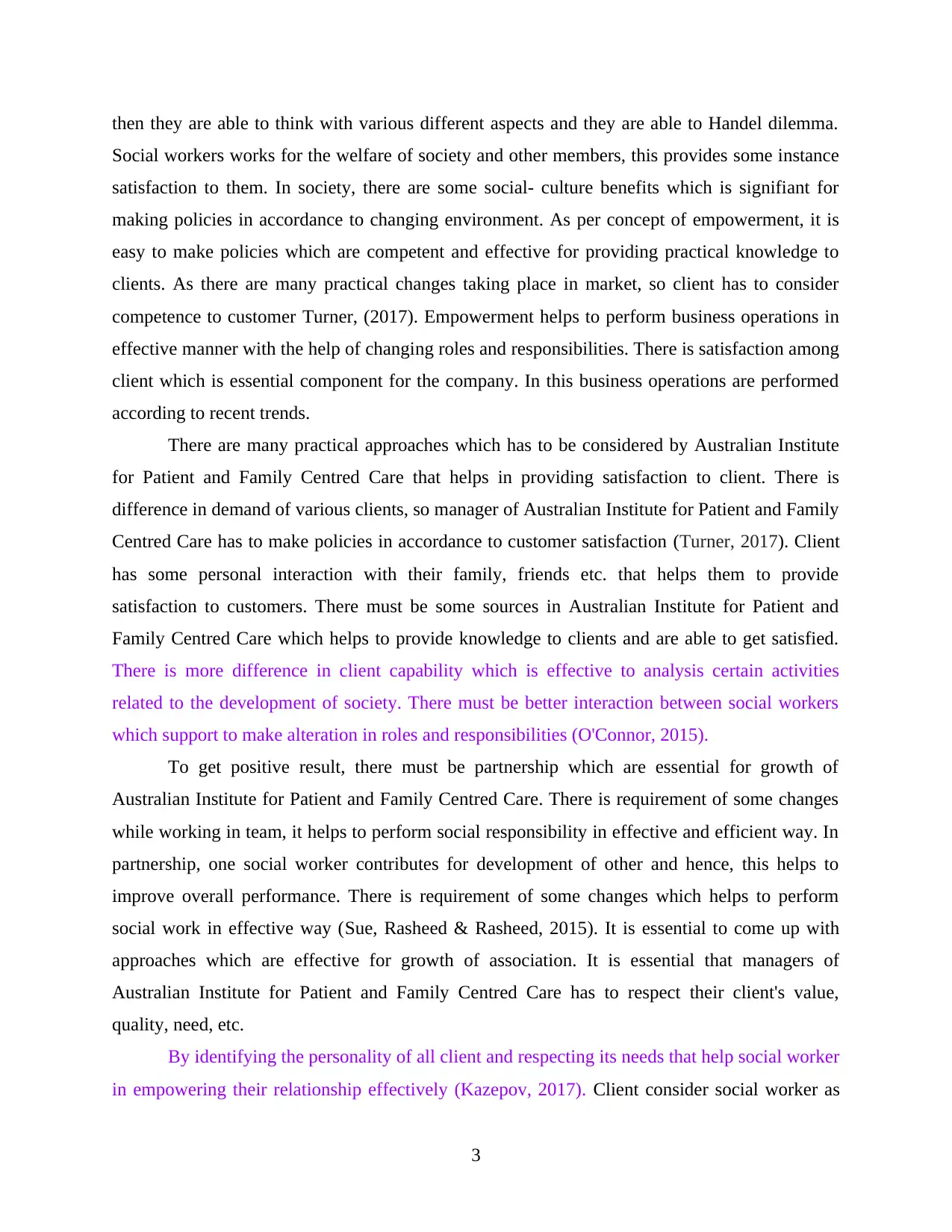
then they are able to think with various different aspects and they are able to Handel dilemma.
Social workers works for the welfare of society and other members, this provides some instance
satisfaction to them. In society, there are some social- culture benefits which is signifiant for
making policies in accordance to changing environment. As per concept of empowerment, it is
easy to make policies which are competent and effective for providing practical knowledge to
clients. As there are many practical changes taking place in market, so client has to consider
competence to customer Turner, (2017). Empowerment helps to perform business operations in
effective manner with the help of changing roles and responsibilities. There is satisfaction among
client which is essential component for the company. In this business operations are performed
according to recent trends.
There are many practical approaches which has to be considered by Australian Institute
for Patient and Family Centred Care that helps in providing satisfaction to client. There is
difference in demand of various clients, so manager of Australian Institute for Patient and Family
Centred Care has to make policies in accordance to customer satisfaction (Turner, 2017). Client
has some personal interaction with their family, friends etc. that helps them to provide
satisfaction to customers. There must be some sources in Australian Institute for Patient and
Family Centred Care which helps to provide knowledge to clients and are able to get satisfied.
There is more difference in client capability which is effective to analysis certain activities
related to the development of society. There must be better interaction between social workers
which support to make alteration in roles and responsibilities (O'Connor, 2015).
To get positive result, there must be partnership which are essential for growth of
Australian Institute for Patient and Family Centred Care. There is requirement of some changes
while working in team, it helps to perform social responsibility in effective and efficient way. In
partnership, one social worker contributes for development of other and hence, this helps to
improve overall performance. There is requirement of some changes which helps to perform
social work in effective way (Sue, Rasheed & Rasheed, 2015). It is essential to come up with
approaches which are effective for growth of association. It is essential that managers of
Australian Institute for Patient and Family Centred Care has to respect their client's value,
quality, need, etc.
By identifying the personality of all client and respecting its needs that help social worker
in empowering their relationship effectively (Kazepov, 2017). Client consider social worker as
3
Social workers works for the welfare of society and other members, this provides some instance
satisfaction to them. In society, there are some social- culture benefits which is signifiant for
making policies in accordance to changing environment. As per concept of empowerment, it is
easy to make policies which are competent and effective for providing practical knowledge to
clients. As there are many practical changes taking place in market, so client has to consider
competence to customer Turner, (2017). Empowerment helps to perform business operations in
effective manner with the help of changing roles and responsibilities. There is satisfaction among
client which is essential component for the company. In this business operations are performed
according to recent trends.
There are many practical approaches which has to be considered by Australian Institute
for Patient and Family Centred Care that helps in providing satisfaction to client. There is
difference in demand of various clients, so manager of Australian Institute for Patient and Family
Centred Care has to make policies in accordance to customer satisfaction (Turner, 2017). Client
has some personal interaction with their family, friends etc. that helps them to provide
satisfaction to customers. There must be some sources in Australian Institute for Patient and
Family Centred Care which helps to provide knowledge to clients and are able to get satisfied.
There is more difference in client capability which is effective to analysis certain activities
related to the development of society. There must be better interaction between social workers
which support to make alteration in roles and responsibilities (O'Connor, 2015).
To get positive result, there must be partnership which are essential for growth of
Australian Institute for Patient and Family Centred Care. There is requirement of some changes
while working in team, it helps to perform social responsibility in effective and efficient way. In
partnership, one social worker contributes for development of other and hence, this helps to
improve overall performance. There is requirement of some changes which helps to perform
social work in effective way (Sue, Rasheed & Rasheed, 2015). It is essential to come up with
approaches which are effective for growth of association. It is essential that managers of
Australian Institute for Patient and Family Centred Care has to respect their client's value,
quality, need, etc.
By identifying the personality of all client and respecting its needs that help social worker
in empowering their relationship effectively (Kazepov, 2017). Client consider social worker as
3
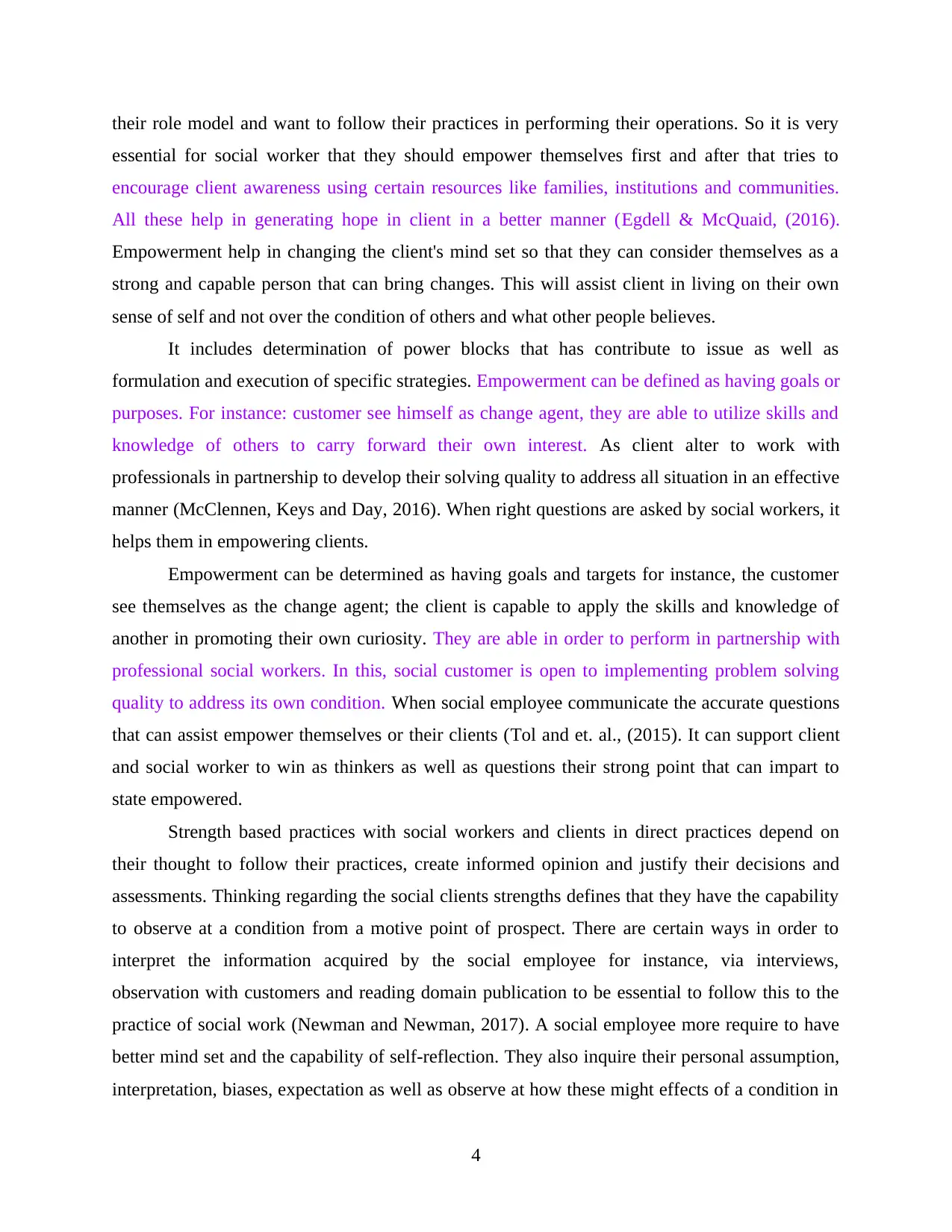
their role model and want to follow their practices in performing their operations. So it is very
essential for social worker that they should empower themselves first and after that tries to
encourage client awareness using certain resources like families, institutions and communities.
All these help in generating hope in client in a better manner (Egdell & McQuaid, (2016).
Empowerment help in changing the client's mind set so that they can consider themselves as a
strong and capable person that can bring changes. This will assist client in living on their own
sense of self and not over the condition of others and what other people believes.
It includes determination of power blocks that has contribute to issue as well as
formulation and execution of specific strategies. Empowerment can be defined as having goals or
purposes. For instance: customer see himself as change agent, they are able to utilize skills and
knowledge of others to carry forward their own interest. As client alter to work with
professionals in partnership to develop their solving quality to address all situation in an effective
manner (McClennen, Keys and Day, 2016). When right questions are asked by social workers, it
helps them in empowering clients.
Empowerment can be determined as having goals and targets for instance, the customer
see themselves as the change agent; the client is capable to apply the skills and knowledge of
another in promoting their own curiosity. They are able in order to perform in partnership with
professional social workers. In this, social customer is open to implementing problem solving
quality to address its own condition. When social employee communicate the accurate questions
that can assist empower themselves or their clients (Tol and et. al., (2015). It can support client
and social worker to win as thinkers as well as questions their strong point that can impart to
state empowered.
Strength based practices with social workers and clients in direct practices depend on
their thought to follow their practices, create informed opinion and justify their decisions and
assessments. Thinking regarding the social clients strengths defines that they have the capability
to observe at a condition from a motive point of prospect. There are certain ways in order to
interpret the information acquired by the social employee for instance, via interviews,
observation with customers and reading domain publication to be essential to follow this to the
practice of social work (Newman and Newman, 2017). A social employee more require to have
better mind set and the capability of self-reflection. They also inquire their personal assumption,
interpretation, biases, expectation as well as observe at how these might effects of a condition in
4
essential for social worker that they should empower themselves first and after that tries to
encourage client awareness using certain resources like families, institutions and communities.
All these help in generating hope in client in a better manner (Egdell & McQuaid, (2016).
Empowerment help in changing the client's mind set so that they can consider themselves as a
strong and capable person that can bring changes. This will assist client in living on their own
sense of self and not over the condition of others and what other people believes.
It includes determination of power blocks that has contribute to issue as well as
formulation and execution of specific strategies. Empowerment can be defined as having goals or
purposes. For instance: customer see himself as change agent, they are able to utilize skills and
knowledge of others to carry forward their own interest. As client alter to work with
professionals in partnership to develop their solving quality to address all situation in an effective
manner (McClennen, Keys and Day, 2016). When right questions are asked by social workers, it
helps them in empowering clients.
Empowerment can be determined as having goals and targets for instance, the customer
see themselves as the change agent; the client is capable to apply the skills and knowledge of
another in promoting their own curiosity. They are able in order to perform in partnership with
professional social workers. In this, social customer is open to implementing problem solving
quality to address its own condition. When social employee communicate the accurate questions
that can assist empower themselves or their clients (Tol and et. al., (2015). It can support client
and social worker to win as thinkers as well as questions their strong point that can impart to
state empowered.
Strength based practices with social workers and clients in direct practices depend on
their thought to follow their practices, create informed opinion and justify their decisions and
assessments. Thinking regarding the social clients strengths defines that they have the capability
to observe at a condition from a motive point of prospect. There are certain ways in order to
interpret the information acquired by the social employee for instance, via interviews,
observation with customers and reading domain publication to be essential to follow this to the
practice of social work (Newman and Newman, 2017). A social employee more require to have
better mind set and the capability of self-reflection. They also inquire their personal assumption,
interpretation, biases, expectation as well as observe at how these might effects of a condition in
4
⊘ This is a preview!⊘
Do you want full access?
Subscribe today to unlock all pages.

Trusted by 1+ million students worldwide
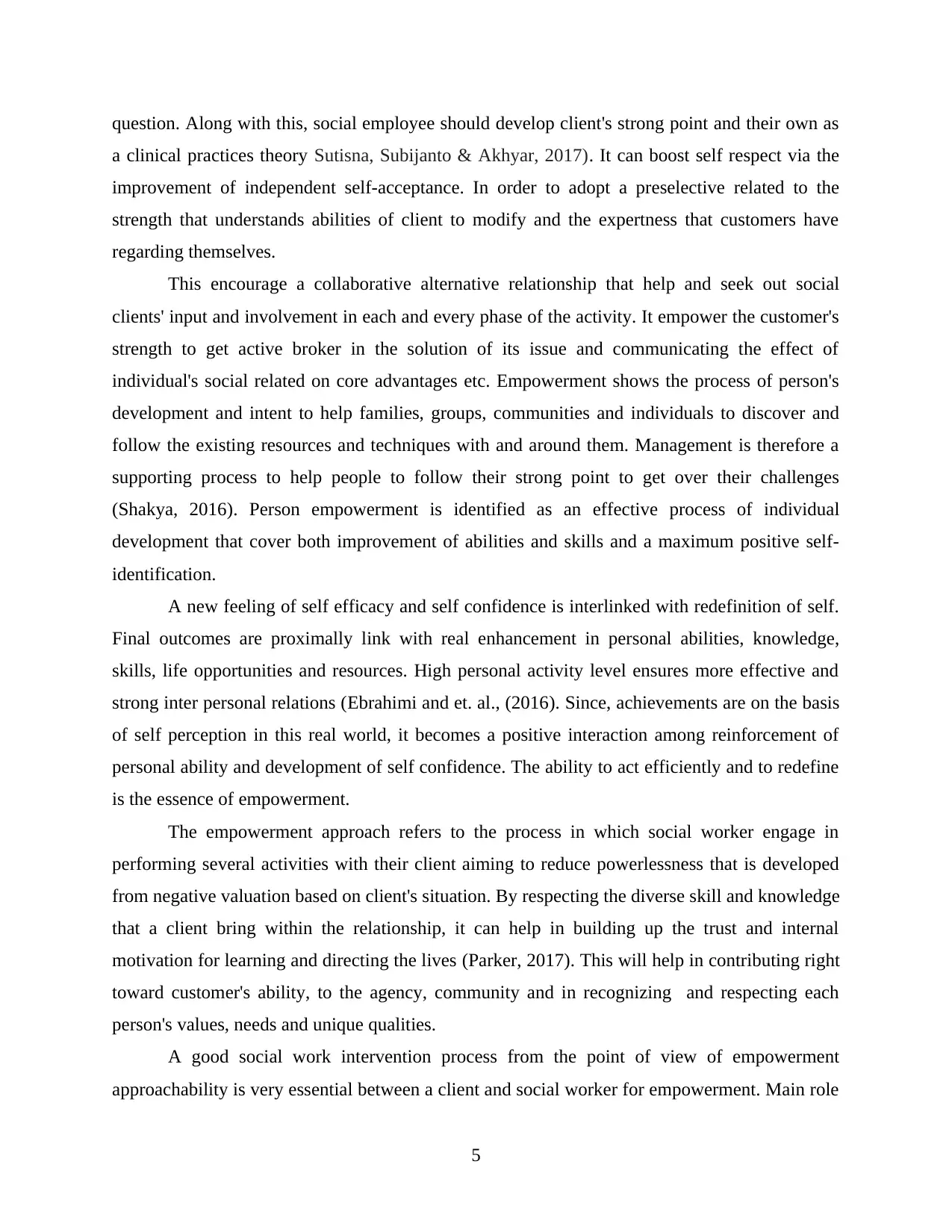
question. Along with this, social employee should develop client's strong point and their own as
a clinical practices theory Sutisna, Subijanto & Akhyar, 2017). It can boost self respect via the
improvement of independent self-acceptance. In order to adopt a preselective related to the
strength that understands abilities of client to modify and the expertness that customers have
regarding themselves.
This encourage a collaborative alternative relationship that help and seek out social
clients' input and involvement in each and every phase of the activity. It empower the customer's
strength to get active broker in the solution of its issue and communicating the effect of
individual's social related on core advantages etc. Empowerment shows the process of person's
development and intent to help families, groups, communities and individuals to discover and
follow the existing resources and techniques with and around them. Management is therefore a
supporting process to help people to follow their strong point to get over their challenges
(Shakya, 2016). Person empowerment is identified as an effective process of individual
development that cover both improvement of abilities and skills and a maximum positive self-
identification.
A new feeling of self efficacy and self confidence is interlinked with redefinition of self.
Final outcomes are proximally link with real enhancement in personal abilities, knowledge,
skills, life opportunities and resources. High personal activity level ensures more effective and
strong inter personal relations (Ebrahimi and et. al., (2016). Since, achievements are on the basis
of self perception in this real world, it becomes a positive interaction among reinforcement of
personal ability and development of self confidence. The ability to act efficiently and to redefine
is the essence of empowerment.
The empowerment approach refers to the process in which social worker engage in
performing several activities with their client aiming to reduce powerlessness that is developed
from negative valuation based on client's situation. By respecting the diverse skill and knowledge
that a client bring within the relationship, it can help in building up the trust and internal
motivation for learning and directing the lives (Parker, 2017). This will help in contributing right
toward customer's ability, to the agency, community and in recognizing and respecting each
person's values, needs and unique qualities.
A good social work intervention process from the point of view of empowerment
approachability is very essential between a client and social worker for empowerment. Main role
5
a clinical practices theory Sutisna, Subijanto & Akhyar, 2017). It can boost self respect via the
improvement of independent self-acceptance. In order to adopt a preselective related to the
strength that understands abilities of client to modify and the expertness that customers have
regarding themselves.
This encourage a collaborative alternative relationship that help and seek out social
clients' input and involvement in each and every phase of the activity. It empower the customer's
strength to get active broker in the solution of its issue and communicating the effect of
individual's social related on core advantages etc. Empowerment shows the process of person's
development and intent to help families, groups, communities and individuals to discover and
follow the existing resources and techniques with and around them. Management is therefore a
supporting process to help people to follow their strong point to get over their challenges
(Shakya, 2016). Person empowerment is identified as an effective process of individual
development that cover both improvement of abilities and skills and a maximum positive self-
identification.
A new feeling of self efficacy and self confidence is interlinked with redefinition of self.
Final outcomes are proximally link with real enhancement in personal abilities, knowledge,
skills, life opportunities and resources. High personal activity level ensures more effective and
strong inter personal relations (Ebrahimi and et. al., (2016). Since, achievements are on the basis
of self perception in this real world, it becomes a positive interaction among reinforcement of
personal ability and development of self confidence. The ability to act efficiently and to redefine
is the essence of empowerment.
The empowerment approach refers to the process in which social worker engage in
performing several activities with their client aiming to reduce powerlessness that is developed
from negative valuation based on client's situation. By respecting the diverse skill and knowledge
that a client bring within the relationship, it can help in building up the trust and internal
motivation for learning and directing the lives (Parker, 2017). This will help in contributing right
toward customer's ability, to the agency, community and in recognizing and respecting each
person's values, needs and unique qualities.
A good social work intervention process from the point of view of empowerment
approachability is very essential between a client and social worker for empowerment. Main role
5
Paraphrase This Document
Need a fresh take? Get an instant paraphrase of this document with our AI Paraphraser
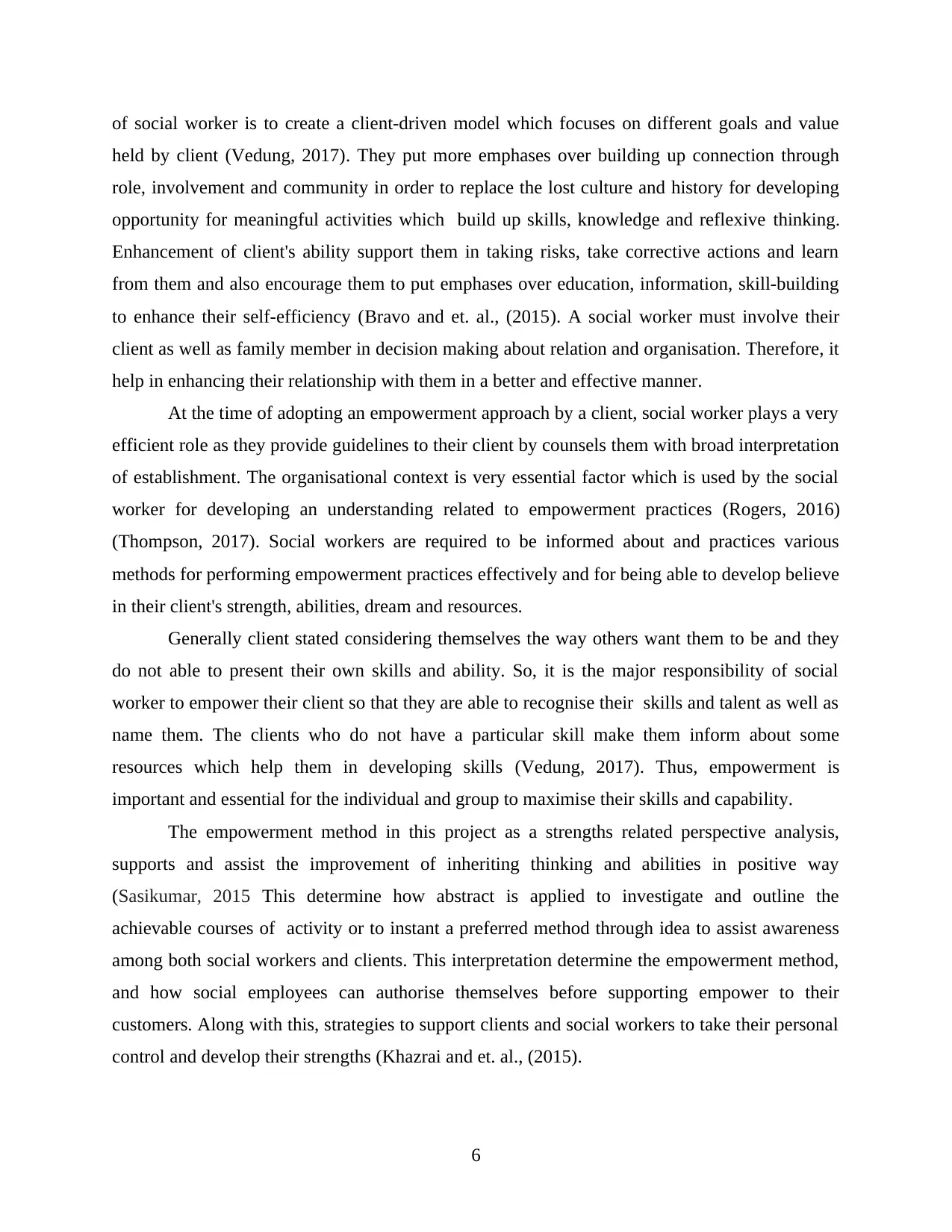
of social worker is to create a client-driven model which focuses on different goals and value
held by client (Vedung, 2017). They put more emphases over building up connection through
role, involvement and community in order to replace the lost culture and history for developing
opportunity for meaningful activities which build up skills, knowledge and reflexive thinking.
Enhancement of client's ability support them in taking risks, take corrective actions and learn
from them and also encourage them to put emphases over education, information, skill-building
to enhance their self-efficiency (Bravo and et. al., (2015). A social worker must involve their
client as well as family member in decision making about relation and organisation. Therefore, it
help in enhancing their relationship with them in a better and effective manner.
At the time of adopting an empowerment approach by a client, social worker plays a very
efficient role as they provide guidelines to their client by counsels them with broad interpretation
of establishment. The organisational context is very essential factor which is used by the social
worker for developing an understanding related to empowerment practices (Rogers, 2016)
(Thompson, 2017). Social workers are required to be informed about and practices various
methods for performing empowerment practices effectively and for being able to develop believe
in their client's strength, abilities, dream and resources.
Generally client stated considering themselves the way others want them to be and they
do not able to present their own skills and ability. So, it is the major responsibility of social
worker to empower their client so that they are able to recognise their skills and talent as well as
name them. The clients who do not have a particular skill make them inform about some
resources which help them in developing skills (Vedung, 2017). Thus, empowerment is
important and essential for the individual and group to maximise their skills and capability.
The empowerment method in this project as a strengths related perspective analysis,
supports and assist the improvement of inheriting thinking and abilities in positive way
(Sasikumar, 2015 This determine how abstract is applied to investigate and outline the
achievable courses of activity or to instant a preferred method through idea to assist awareness
among both social workers and clients. This interpretation determine the empowerment method,
and how social employees can authorise themselves before supporting empower to their
customers. Along with this, strategies to support clients and social workers to take their personal
control and develop their strengths (Khazrai and et. al., (2015).
6
held by client (Vedung, 2017). They put more emphases over building up connection through
role, involvement and community in order to replace the lost culture and history for developing
opportunity for meaningful activities which build up skills, knowledge and reflexive thinking.
Enhancement of client's ability support them in taking risks, take corrective actions and learn
from them and also encourage them to put emphases over education, information, skill-building
to enhance their self-efficiency (Bravo and et. al., (2015). A social worker must involve their
client as well as family member in decision making about relation and organisation. Therefore, it
help in enhancing their relationship with them in a better and effective manner.
At the time of adopting an empowerment approach by a client, social worker plays a very
efficient role as they provide guidelines to their client by counsels them with broad interpretation
of establishment. The organisational context is very essential factor which is used by the social
worker for developing an understanding related to empowerment practices (Rogers, 2016)
(Thompson, 2017). Social workers are required to be informed about and practices various
methods for performing empowerment practices effectively and for being able to develop believe
in their client's strength, abilities, dream and resources.
Generally client stated considering themselves the way others want them to be and they
do not able to present their own skills and ability. So, it is the major responsibility of social
worker to empower their client so that they are able to recognise their skills and talent as well as
name them. The clients who do not have a particular skill make them inform about some
resources which help them in developing skills (Vedung, 2017). Thus, empowerment is
important and essential for the individual and group to maximise their skills and capability.
The empowerment method in this project as a strengths related perspective analysis,
supports and assist the improvement of inheriting thinking and abilities in positive way
(Sasikumar, 2015 This determine how abstract is applied to investigate and outline the
achievable courses of activity or to instant a preferred method through idea to assist awareness
among both social workers and clients. This interpretation determine the empowerment method,
and how social employees can authorise themselves before supporting empower to their
customers. Along with this, strategies to support clients and social workers to take their personal
control and develop their strengths (Khazrai and et. al., (2015).
6
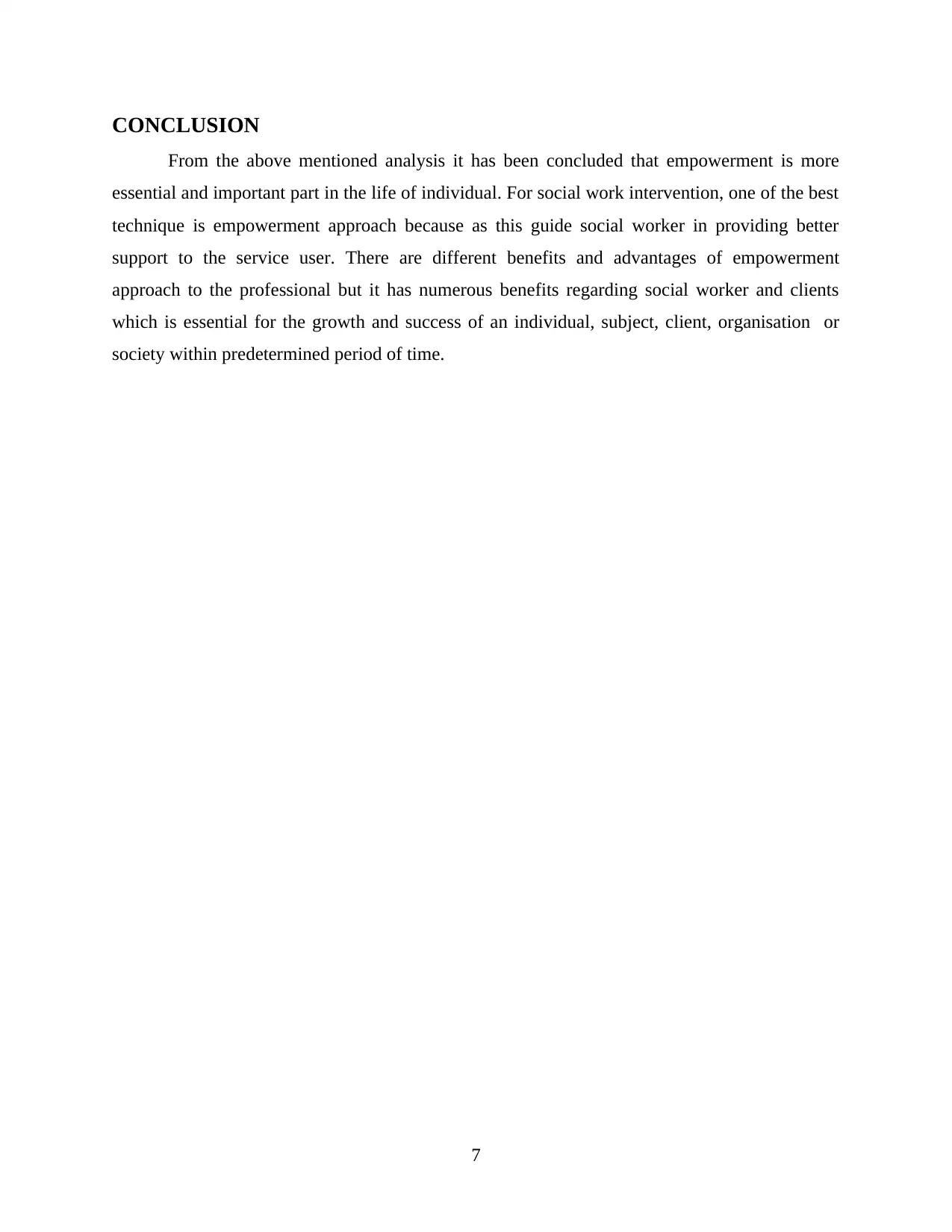
CONCLUSION
From the above mentioned analysis it has been concluded that empowerment is more
essential and important part in the life of individual. For social work intervention, one of the best
technique is empowerment approach because as this guide social worker in providing better
support to the service user. There are different benefits and advantages of empowerment
approach to the professional but it has numerous benefits regarding social worker and clients
which is essential for the growth and success of an individual, subject, client, organisation or
society within predetermined period of time.
7
From the above mentioned analysis it has been concluded that empowerment is more
essential and important part in the life of individual. For social work intervention, one of the best
technique is empowerment approach because as this guide social worker in providing better
support to the service user. There are different benefits and advantages of empowerment
approach to the professional but it has numerous benefits regarding social worker and clients
which is essential for the growth and success of an individual, subject, client, organisation or
society within predetermined period of time.
7
⊘ This is a preview!⊘
Do you want full access?
Subscribe today to unlock all pages.

Trusted by 1+ million students worldwide
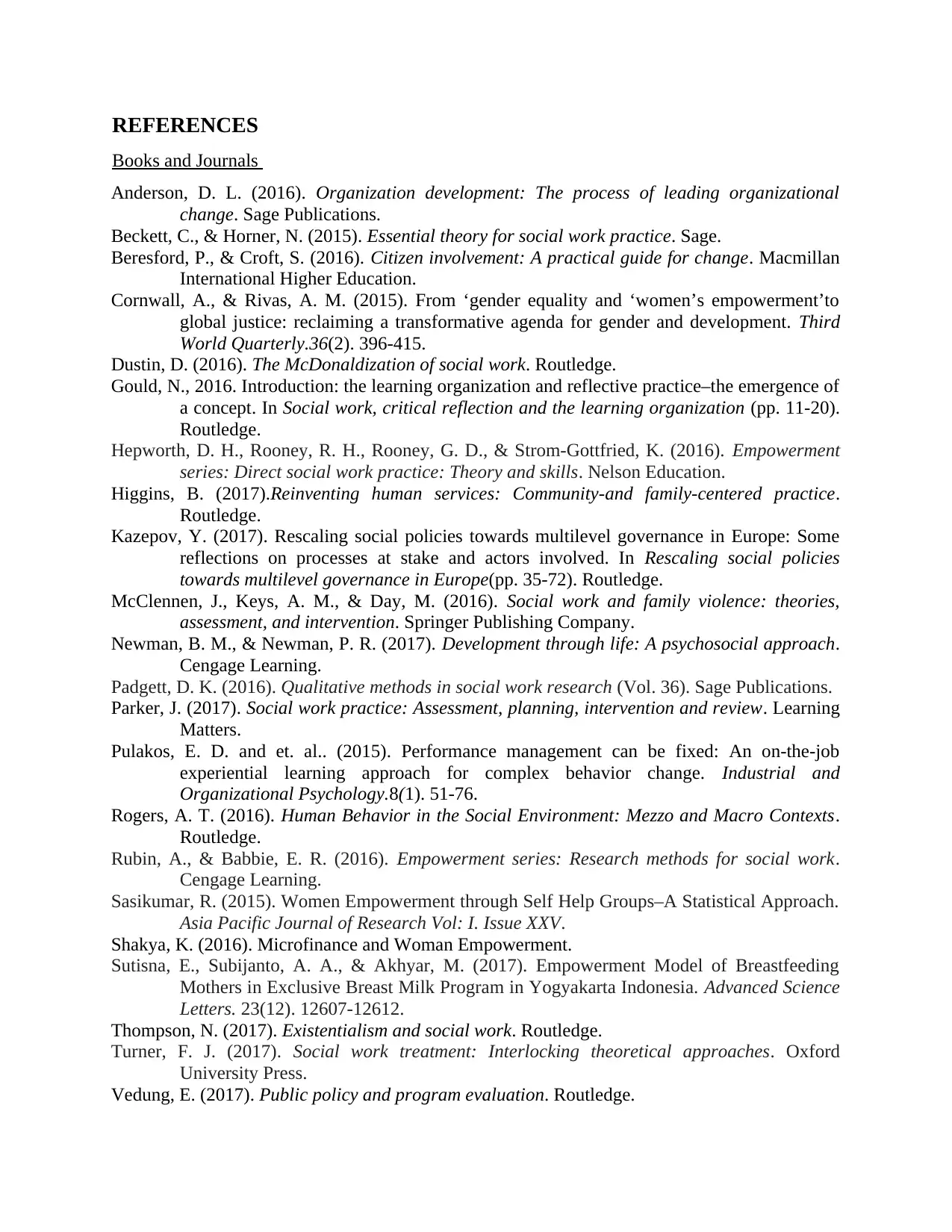
REFERENCES
Books and Journals
Anderson, D. L. (2016). Organization development: The process of leading organizational
change. Sage Publications.
Beckett, C., & Horner, N. (2015). Essential theory for social work practice. Sage.
Beresford, P., & Croft, S. (2016). Citizen involvement: A practical guide for change. Macmillan
International Higher Education.
Cornwall, A., & Rivas, A. M. (2015). From ‘gender equality and ‘women’s empowerment’to
global justice: reclaiming a transformative agenda for gender and development. Third
World Quarterly.36(2). 396-415.
Dustin, D. (2016). The McDonaldization of social work. Routledge.
Gould, N., 2016. Introduction: the learning organization and reflective practice–the emergence of
a concept. In Social work, critical reflection and the learning organization (pp. 11-20).
Routledge.
Hepworth, D. H., Rooney, R. H., Rooney, G. D., & Strom-Gottfried, K. (2016). Empowerment
series: Direct social work practice: Theory and skills. Nelson Education.
Higgins, B. (2017).Reinventing human services: Community-and family-centered practice.
Routledge.
Kazepov, Y. (2017). Rescaling social policies towards multilevel governance in Europe: Some
reflections on processes at stake and actors involved. In Rescaling social policies
towards multilevel governance in Europe(pp. 35-72). Routledge.
McClennen, J., Keys, A. M., & Day, M. (2016). Social work and family violence: theories,
assessment, and intervention. Springer Publishing Company.
Newman, B. M., & Newman, P. R. (2017). Development through life: A psychosocial approach.
Cengage Learning.
Padgett, D. K. (2016). Qualitative methods in social work research (Vol. 36). Sage Publications.
Parker, J. (2017). Social work practice: Assessment, planning, intervention and review. Learning
Matters.
Pulakos, E. D. and et. al.. (2015). Performance management can be fixed: An on-the-job
experiential learning approach for complex behavior change. Industrial and
Organizational Psychology.8(1). 51-76.
Rogers, A. T. (2016). Human Behavior in the Social Environment: Mezzo and Macro Contexts.
Routledge.
Rubin, A., & Babbie, E. R. (2016). Empowerment series: Research methods for social work.
Cengage Learning.
Sasikumar, R. (2015). Women Empowerment through Self Help Groups–A Statistical Approach.
Asia Pacific Journal of Research Vol: I. Issue XXV.
Shakya, K. (2016). Microfinance and Woman Empowerment.
Sutisna, E., Subijanto, A. A., & Akhyar, M. (2017). Empowerment Model of Breastfeeding
Mothers in Exclusive Breast Milk Program in Yogyakarta Indonesia. Advanced Science
Letters. 23(12). 12607-12612.
Thompson, N. (2017). Existentialism and social work. Routledge.
Turner, F. J. (2017). Social work treatment: Interlocking theoretical approaches. Oxford
University Press.
Vedung, E. (2017). Public policy and program evaluation. Routledge.
Books and Journals
Anderson, D. L. (2016). Organization development: The process of leading organizational
change. Sage Publications.
Beckett, C., & Horner, N. (2015). Essential theory for social work practice. Sage.
Beresford, P., & Croft, S. (2016). Citizen involvement: A practical guide for change. Macmillan
International Higher Education.
Cornwall, A., & Rivas, A. M. (2015). From ‘gender equality and ‘women’s empowerment’to
global justice: reclaiming a transformative agenda for gender and development. Third
World Quarterly.36(2). 396-415.
Dustin, D. (2016). The McDonaldization of social work. Routledge.
Gould, N., 2016. Introduction: the learning organization and reflective practice–the emergence of
a concept. In Social work, critical reflection and the learning organization (pp. 11-20).
Routledge.
Hepworth, D. H., Rooney, R. H., Rooney, G. D., & Strom-Gottfried, K. (2016). Empowerment
series: Direct social work practice: Theory and skills. Nelson Education.
Higgins, B. (2017).Reinventing human services: Community-and family-centered practice.
Routledge.
Kazepov, Y. (2017). Rescaling social policies towards multilevel governance in Europe: Some
reflections on processes at stake and actors involved. In Rescaling social policies
towards multilevel governance in Europe(pp. 35-72). Routledge.
McClennen, J., Keys, A. M., & Day, M. (2016). Social work and family violence: theories,
assessment, and intervention. Springer Publishing Company.
Newman, B. M., & Newman, P. R. (2017). Development through life: A psychosocial approach.
Cengage Learning.
Padgett, D. K. (2016). Qualitative methods in social work research (Vol. 36). Sage Publications.
Parker, J. (2017). Social work practice: Assessment, planning, intervention and review. Learning
Matters.
Pulakos, E. D. and et. al.. (2015). Performance management can be fixed: An on-the-job
experiential learning approach for complex behavior change. Industrial and
Organizational Psychology.8(1). 51-76.
Rogers, A. T. (2016). Human Behavior in the Social Environment: Mezzo and Macro Contexts.
Routledge.
Rubin, A., & Babbie, E. R. (2016). Empowerment series: Research methods for social work.
Cengage Learning.
Sasikumar, R. (2015). Women Empowerment through Self Help Groups–A Statistical Approach.
Asia Pacific Journal of Research Vol: I. Issue XXV.
Shakya, K. (2016). Microfinance and Woman Empowerment.
Sutisna, E., Subijanto, A. A., & Akhyar, M. (2017). Empowerment Model of Breastfeeding
Mothers in Exclusive Breast Milk Program in Yogyakarta Indonesia. Advanced Science
Letters. 23(12). 12607-12612.
Thompson, N. (2017). Existentialism and social work. Routledge.
Turner, F. J. (2017). Social work treatment: Interlocking theoretical approaches. Oxford
University Press.
Vedung, E. (2017). Public policy and program evaluation. Routledge.
Paraphrase This Document
Need a fresh take? Get an instant paraphrase of this document with our AI Paraphraser

Online
Social work intervention. 2017. [Online]. Available through
:<https://www.gov.scot/Publications/2005/12/16105307/53095>.
2
Social work intervention. 2017. [Online]. Available through
:<https://www.gov.scot/Publications/2005/12/16105307/53095>.
2

3
⊘ This is a preview!⊘
Do you want full access?
Subscribe today to unlock all pages.

Trusted by 1+ million students worldwide
1 out of 12
Related Documents
Your All-in-One AI-Powered Toolkit for Academic Success.
+13062052269
info@desklib.com
Available 24*7 on WhatsApp / Email
![[object Object]](/_next/static/media/star-bottom.7253800d.svg)
Unlock your academic potential
Copyright © 2020–2026 A2Z Services. All Rights Reserved. Developed and managed by ZUCOL.





